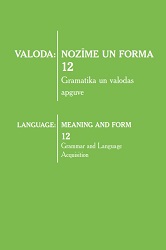„Es neuzskatu, ka latviešu valoda sastāv tikai no gramatikas”: vidusskolēnu valodas lietpratība un attieksme pret latviešu valodas mācīšanos
“I don’t think that Latvian language consists only of grammar”: Secondary school students’ language proficiency and their attitudes towards learning Latvian
Author(s): Sanita MartenaSubject(s): Syntax, Lexis, Language acquisition, Baltic Languages, School education
Published by: Latvijas Universitātes Akadēmiskais apgāds
Keywords: language proficiency; basic and higher / extended language cognition; argumentative writing; essays; attitude towards language learning; Latvian; language teaching;
Summary/Abstract: The paper analyses proficiency in Latvian, experiences with learning Latvian and attitudes towards Latvian lessons as reported by young persons in Latvia at the end of their secondary school careers. It is based on the data of two studies conducted among students from both Latvian-medium of instruction schools and bilingual minority schools: first, research on proficiency in Latvian in students` essays (2018), and second, on students’ attitudes towards learning and teaching processes of Latvian (2018–2019). The data is analysed according to the theory of language proficiency (Hulstijn 2015), focussing on both basic and higher / extended language cognition. In addition, theoretical findings on argumentative writing quality are used for analysing students’ essays, particular regarding comprehension of the essays’ topics, skills to express oneself and one’s opinion, and lexical complexity. The essays reveal the students’ written performative competence, i.e., the level they have reached during 12 years of schooling in Latvian and other subjects. The data show that there are different types of problems regarding deviation from language norms. In addition to more traditional levels of error analysis (e.g. punctuation errors when separating participles’ parts of compound sentences), the paper demonstrates how the students’ texts are characterised by a lack of vocabulary development regarding, e.g., lexical diversity, polysemy, or the correct use of specific terminology. Many of the essays do not describe phenomena, events, or persons in sufficiently precise ways, which is grounded both in a lack of knowledge of the topics and insufficient vocabulary. While the essays provide evidence of the outcomes of learning Latvian, the study on attitudes towards the learning processes reveals possible reasons, which affect the acquisition of Latvian. Many students report a lack of motivation based on difficulties in understanding the teachers’ explanations of Latvian grammar, an insufficient inclusion of functional aspects of language, and occasionally – lack of adequate communication between students and teachers.
Journal: Valoda: nozīme un forma
- Issue Year: 2021
- Issue No: 12
- Page Range: 178-194
- Page Count: 17
- Language: Latvian

